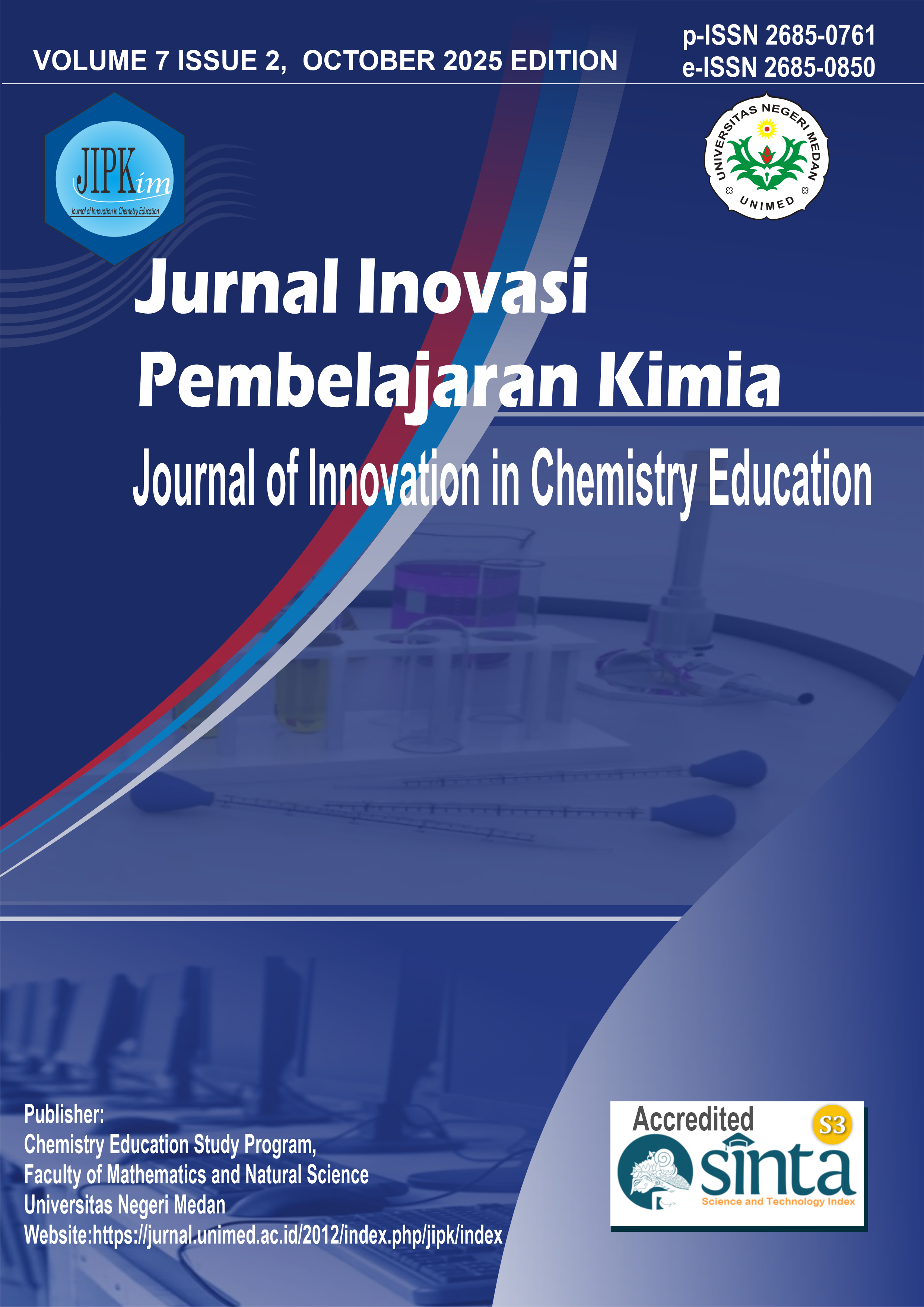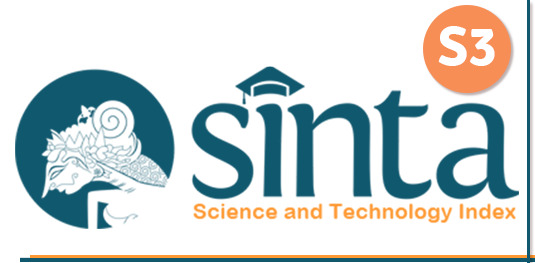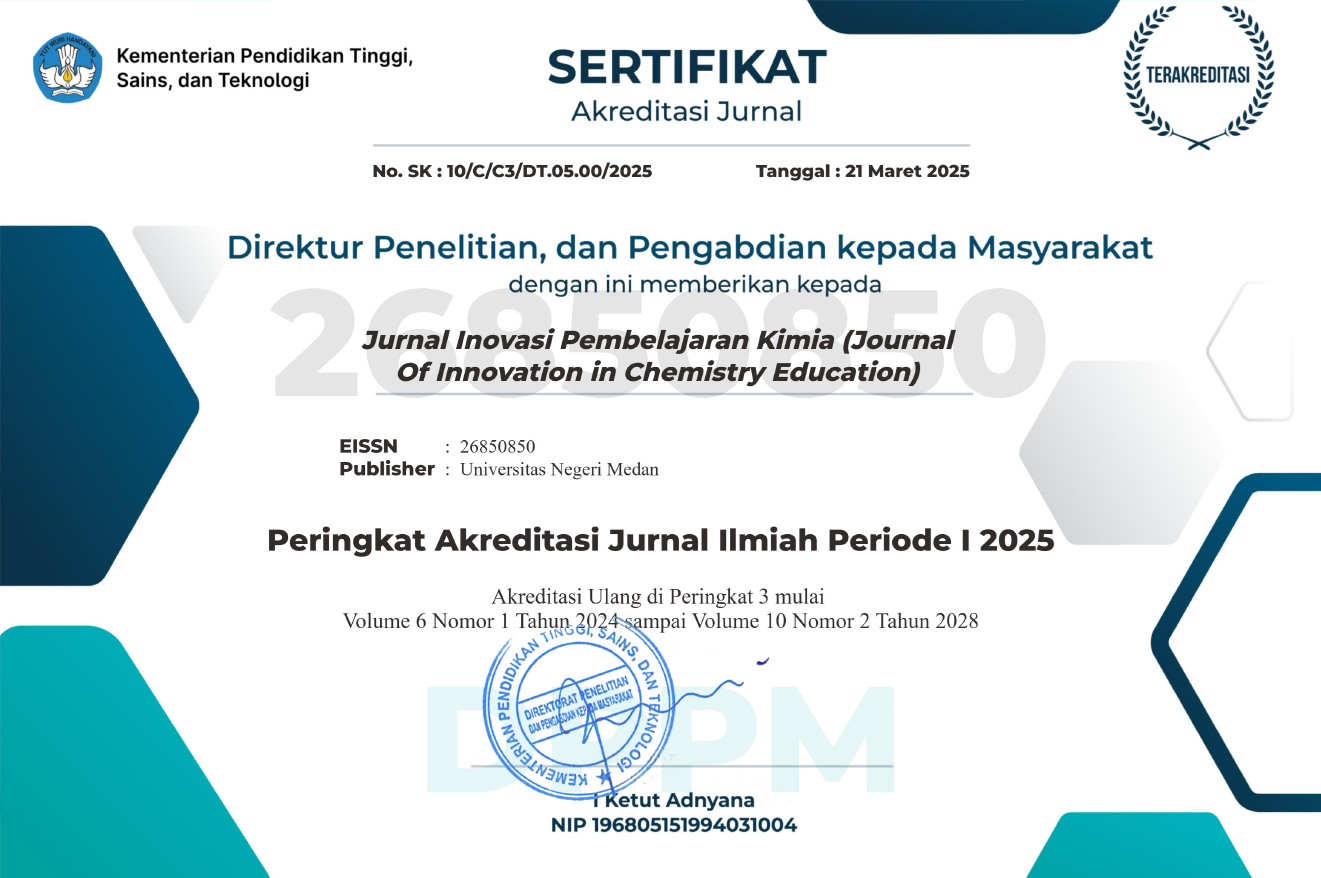Digital Literacy and Intrinsic Motivation of High-Achieving Students in Chemistry Learning at Senior High School
DOI:
https://doi.org/10.24114/jipk.v7i2.69159Keywords:
digital literacy, intrinsic motivatio, high-achieving students, chemistry learningAbstract
This study examines the digital literacy and intrinsic motivation of high-achieving chemistry students at SMA Negeri 1 Kerinci in the 2024/2025 academic year, and explores the relationship between these variables. The sample comprised science program students who participated in the National Science Olympiad (KSN). Using a mixed-methods sequential explanatory design, quantitative data were collected through questionnaires based on six digital literacy indicators and three intrinsic motivation indicators, followed by structured interviews for qualitative insights. Results showed that students demonstrated high digital literacy in “Uses to Produce Original Work” and “Considers Source,” but lower performance in “Selects.” Their intrinsic motivation was also high, particularly in learning activity, perseverance, and exam resilience. The Pearson correlation test indicated a significant positive relationship between digital literacy and intrinsic motivation (r = 0.679, p < 0.05), suggesting that improved digital literacy enhances students’ internal drive to learn. Overall, the findings underscore the need to integrate digital literacy into chemistry learning strategies to foster greater motivation and holistic academic achievement among students.References
Dewi, L. E., Syofyan, R., Putra, D. G., Ekonomi, D. P., Ekonomi, F., & Negeri, U. (2024). Pengaruh Literasi Digital dan Motivasi Belajar Terhadap Hasil Belajar Siswa. 7(2), 288–298.
Eriany, P., Hernawati, L., & Goeritno, H. (2013). Studi Deskriptif Mengenai Faktor-Faktor yang Mempengaruhi Motivasi Mengikuti Kegiatan Bimbingan Belajar pada Siswa SMP di Semarang. Psikodimensia, 13(1), 115–130.
Hardika, A., & Isroah. (2022). The Effect of Facilities Availability, Digital Literacy, and Learning Motivation Towards the Effectiveness of Online Learning of the 2018 and 2019 Fe Uny Accounting Education Study Program.
Herlina, T., Nurhayati, B., & Andi, M. (2015). Peningkatan Motivasi, Aktivitas, Dan Hasil Belajar Peserta Didik Melalui Penerapan Strategi Pembelajaran Discovery-Inquiry Di Kelas Xc Man Binamu Jeneponto. Jurnal Biotek, 3(1), 67–77. https://scholar.google.com/citations?view_op=view_citation&hl=en&user=nLvkc6AAAAAJ&pagesize=100&citation_for_view=nLvkc6AAAAAJ:YsMSGLbcyi4C
Kajin, S. (2018). engaruh Pembelajaran Berbasis Literasi Digital Terhadap Motivasi Dan Hasil Belajar Kognitif di MTs N Mojosari dan MTs N Sooko Mojokerto. PROGRESSA: Journal of Islamic Religious Instruction, 2(1), 133–142. https://doi.org/10.32616/pgr.v2.1.119.133-142
Nababan. (2014). Penerapan Model Pembelajaran ARIAS Terintegratif untuk Meningkat Motivasi Belajar Siswa Kelas XI MIA 1 SMA 6 Negeri 6 Kota Jambi. Universitas Jambi.
Patmanthara, S., & Hidayat, W. N. (2018). Improving Vocational High School Students Digital Literacy Skill through Blended Learning Model. Journal of Physics: Conference Series, 1028(1). https://doi.org/10.1088/1742-6596/1028/1/012076
Wijayati, N., Kusuma, E., Sri, D., & Sumarti, S. (2019). Pembelajaran Berbasis Digital Di Jurusan Kimia Fmipa Unnes. Jurnal Inovasi Pendidikan Kimia, 13(1), 2318–2325.
Yusuf, A. M., Hidayatullah, S., & Tauhidah, D. (2022). The relationship between digital and scientific literacy with biology cognitive learning outcomes of high school students. Assimilation: Indonesian Journal of Biology Education, 5(1), 9–18. https://doi.org/10.17509/aijbe.v5i1.43322













